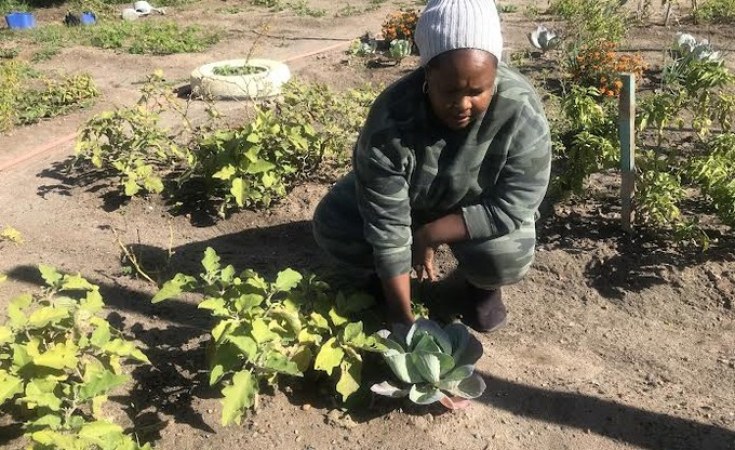Former dumpsites transformed into vegetable plots
Residents living in the N2 Gateway social housing project flats in Langa have turned dumpsites on empty land into three thriving vegetable gardens.
Spinach, cabbages, kale, potatoes, onions, turnips, beetroot, pepper, peas, tomatoes, butternut, carrots, brinjal, sweet potatoes are grown as well as parsley, rosemary lavender, and fennel. The first resident to start a garden, in 2019, was Paul Moletsane. A few years later he was joined by Thobeka Gacula and Nomsa Gxibha, and now eight people work in this garden.
"It was a dumping place when Moletsane came to us and said he needs some people to do the garden," says Gacula. "I volunteered. We started to dig and clean the garden. We would love to work with young people to expand the garden and help our struggling community."
She said the garden had been provided with seeds by the church and Shoprite, and the South African Urban Food and Farming Trust was helping with training, more seeds, compost, and vegetable sales.
Also living in the flats, Athenkosi Nyovane and Olwethu Joseph Oliphants, who were unemployed, started their own garden during the pandemic to help their families and other residents of Langa.
"We just recently planted lemon, naartjie and orange trees," Nyovane said. "Currently we sell our spinach for R12. When we have work, we get a few guys in the community who are not employed to help us and pay them from the money raised from selling vegetables."
Nyovane says they are looking for funding for fencing, tools, containers, water tanks and a borehole. At the moment they use water from fire hydrants.

"We are also looking for an opportunity to provide vegetables to supermarkets, schools and old age homes so that people in our area eat organic vegetables."
A third garden is run by Bongiwe Mgweba, who works full time in the garden with two other women. Her project, which she named Ayabulela, needs fencing, water tanks and compost, she says.
"This place was a dumping area and people still dump empty bottles. During the night the bottles shine so I use them to make vegetable beds and scare dogs away so that they don't poop in the garden."
Mgweba says she gives away vegetables to people who say they have no food to cook in the house. "But I encourage them to bring the little they have, even R5, because I need money to maintain the garden and buy seeds."
She has brinjal and turnips ready for harvesting and says her children enjoy working in the garden with her. "They have also introduced their friends and young people from the flats who are growing and harvesting vegetables from my garden."
The Masakhe Foundation, started by Thulani Fesi and Mpilo Ngcukana, supports some 30 gardens across Langa. The biggest is at the back of 16 on Lerotholi, an art gallery started by Fesi and Ngcukana.
Fesi said the pair had seen women growing vegetables on the piece of land, which is owned by the Red Cross, before they started the gallery. "Around 2018 when the building of the gallery started, they were still here. We noticed how much of a struggle it was for them to maintain the garden. You'd see the garden looking beautiful in winter, then come summer, the crops would be all dried out."

"When they needed seeds, compost, they would travel almost an hour to Nyanga to buy them. And they had to do this two to three times a week at their age."
The Masakhe Foundation partnered with the South African Urban Food and Farming Trust to help, supplying the women with seeds and compost and training, and developing the garden.
Today the Lerotholi food garden grows cabbages, carrots, beetroot, spring onion, egg plant, cauliflower and tomato. There is also rosemary, coriander, oregano, basil, sage and impepho, marigold flowers to repel insects, and wild marijuana.
There are other vegetable gardens across the N2 highway, in Zone 10, in schools and churches, and in people's yards. One day, says Fesi, all these Masakhe gardens will be connected through an agri-hub, a pilot project by the Urban Food and Farming Trust to support urban farmers.
Fesi says he also considers himself a gardener, having been taught skills by the women on the Lerotholi garden, and has helped out at the garden a few times. "I also have a garden in my house which I started during Covid with my daughter. It's also a vegetable garden, and I have two avocado trees."
Nokwayintombi Mashicila, 72, who lives in the hostel a stone's throw away, is one of the women who started the Lerotholi garden.
"I've always loved gardening from a young age," she says. "I was taught gardening by my parents while I was still a young girl back home in the Eastern Cape. This garden helps us a lot, I love it."


